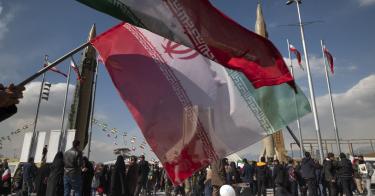Despite Iran’s bad behavior at home and abroad (including its support for Russia’s war on Ukraine), the Biden administration seems blissfully unconcerned about the threat posed by the Islamist regime to our national security interests.
Indeed, President Joe Biden himself called the cornerstone of U.S.-Iran policy—the Obama administration’s flawed Joint Comprehensive Plan of Action—“dead” in a video that emerged in late December. This was after Biden spent nearly two years trying to revive this nuclear deal with Iran.
Surely the Biden administration is aware of Iran’s dogged progress toward developing a nuclear weapon and the incredible gravity of the situation.
Without a doubt, Iran’s blatant violations of the nuclear deal haven’t been small—or invisible. News outlets began reporting last week that the U.N.’s nuclear watchdog, the International Atomic Energy Agency, detected that Iran had enriched uranium up to 84% purity—very close to the generally accepted enrichment level of 90% needed for a nuclear weapon.
Of course, the nuclear deal allows Iran to enrich uranium to 3.67%, a level needed for nuclear reactor fuel. But based on the latest reporting on enrichment levels, it’s no wonder that IAEA chief Rafael Grossi in late January called the nuclear agreement an “empty shell” and expressed concern that Iran had enough fissile material for “several nuclear weapons.”
Iran also has violated the nuclear deal by exceeding uranium stockpiles and putting more advanced uranium-enriching centrifuges online. Importantly, these breaches essentially would allow Tehran to build more bombs more quickly, should it decide to do so.
Beyond violations of the nuclear deal, Iran has been crossing boundaries clearly agreed to at the United Nations. Its testing of nuclear-capable ballistic missiles is in direct contravention of U.N. Security Council Resolution 2231, which endorsed the Iran nuke agreement.
Making matters worse are reports that the new head of al-Qaeda, Saif al-Adel, is based in Iran. Al-Adel, a former Egyptian special forces officer who is one of the FBI’s most wanted terrorists, has been there for years, having been given sanctuary by the regime.
Iran and al-Qaeda aren’t natural allies, since one is majority Shiite Muslim state and the other is Sunni Muslim group, but Tehran is more than willing to support terrorist groups and other proxies that advance its agenda, including al-Qaeda, Hamas, and the Yemeni Houthis.
With Iran’s burgeoning nuclear enterprise—it is on the brink of becoming a nuclear state—the news of the presence of al-Qaeda’s new leader as a guest of the regime isn’t at all comforting.
Indeed, it’s downright horrifying.
A nuclear weapon in the hands of Iran’s radical regime will give Tehran the freedom of action to more aggressively pursue its support of foreign terrorist groups, including al-Qaeda. It also raises the specter of “superterrorism.”
These aren’t scenarios that we—or our allies and friends—can afford.
We agree, Mr. President, that Iran is a significant threat to international security and can’t be allowed to have the bomb.
But with the Iranian nuclear deal “dead,” as you said in your own words, don’t you think we deserve to know what Plan B is?
This piece originally appeared in The Daily Signal



